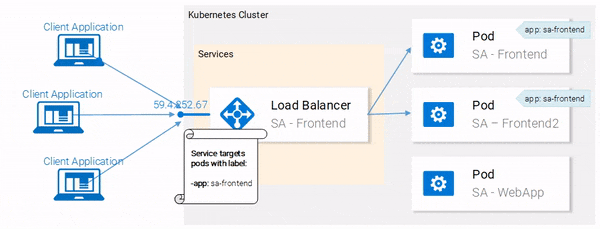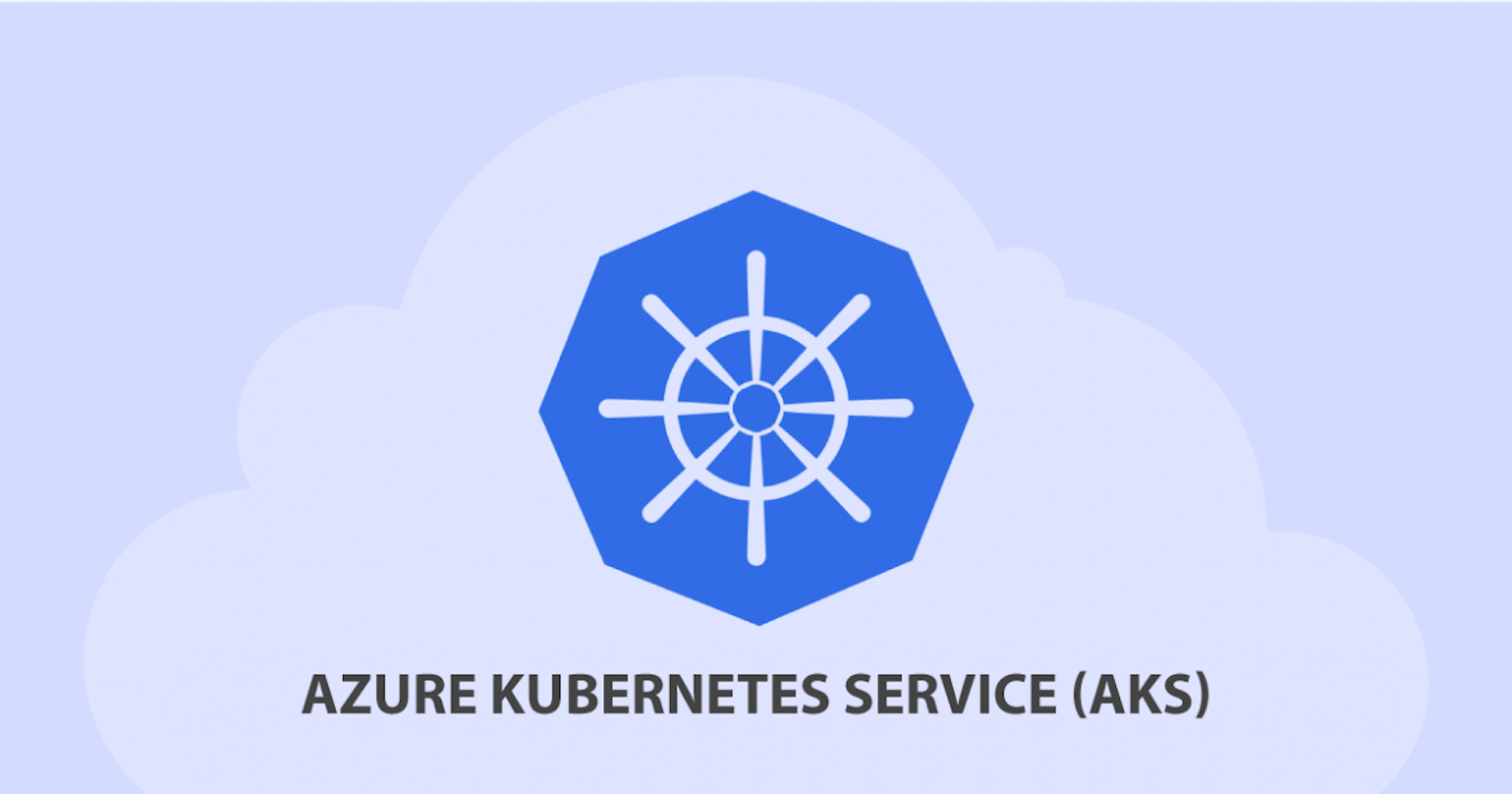A few weeks back I've posted an article about Kubernetes and some of its use cases, this time I will talk about one of the great service provided by Azure Cloud and it is based on Kubernetes. The name of the service is Azure Kubernetes Service (AKS) , so let's begin.
So first of all, what is Azure Kubernetes Service?

Microsoft Azure is a world-renown cloud framework for SMBs to large scale enterprises, while Kubernetes is a modern-day solution that is increasingly becoming the regular technique to handle cloud-native applications in a production environment. Azure Kubernetes Service (AKS) has brought both solutions together that enable customers to build fully-managed Kubernetes clusters quickly and easily.
AKS is an open-source fully managed container orchestration service that became available in June 2018 and is available on the Microsoft Azure public cloud that can be used to deploy, scale and manage Docker containers and container-based applications in a cluster environment.
Azure Kubernetes Service offers provisioning, scaling, and upgrades of resources as per requirement or demand without any downtime in the Kubernetes cluster and the best thing about AKS is that you don’t require deep knowledge and expertise in container orchestration to manage AKS.
AKS is certainly an ideal platform for developers to develop their modern applications using Kubernetes on the Azure architecture where Azure Container Instances are the pretty right choice to deploy containers on the public cloud. The Azure Container Instances help in reducing the stress on developers to deploy and run their applications on Kubernetes architecture.
Benefits of Azure Kubernetes Services.
 Azure Kubernetes Service is currently competing with both Amazon Elastic Kubernetes Service (EKS) and Google Kubernetes Engine (GKE). It offers numerous features such as creating, managing, scaling, and monitoring Azure Kubernetes Clusters, which is attractive for users of Microsoft Azure. The following are some benefits offered by AKS:
Azure Kubernetes Service is currently competing with both Amazon Elastic Kubernetes Service (EKS) and Google Kubernetes Engine (GKE). It offers numerous features such as creating, managing, scaling, and monitoring Azure Kubernetes Clusters, which is attractive for users of Microsoft Azure. The following are some benefits offered by AKS:
- Efficient resource utilization:
The fully managed AKS offers easy deployment and management of containerized applications with efficient resource utilization that elastically provisions additional resources without the headache of managing the Kubernetes infrastructure.
- Faster application development:
Developers spent most of the time on bug-fixing. AKS reduces the debugging time while handling patching, auto-upgrades, and self-healing and simplifies the container orchestration. It definitely saves a lot of time and developers will focus on developing their apps while remaining more productive.
- Security and compliance:
Cybersecurity is one of the most important aspects of modern applications and businesses. AKS integrates with Azure Active Directory (AD) and offers on-demand access to the users to greatly reduce threats and risks. AKS is also completely compliant with the standards and regulatory requirements such as System and Organization Controls (SOC), HIPAA, ISO, and PCI DSS.
- Quicker development and integration:
Azure Kubernetes Service (AKS) supports auto-upgrades, monitoring, and scaling and helps in minimizing the infrastructure maintenance that leads to comparatively faster development and integration. It also supports provisioning additional compute resources in Serverless Kubernetes within seconds without worrying about managing the Kubernetes infrastructure.
Azure Kubernetes Service Features
 Microsoft Azure offers Azure Kubernetes Service that simplifies managed Kubernetes cluster deployment in the public cloud environment and also manages health and monitoring of managed Kubernetes service. Customers can create AKS clusters using the Azure portal or Azure CLI and can manage the agent nodes.
Microsoft Azure offers Azure Kubernetes Service that simplifies managed Kubernetes cluster deployment in the public cloud environment and also manages health and monitoring of managed Kubernetes service. Customers can create AKS clusters using the Azure portal or Azure CLI and can manage the agent nodes.
A template-based deployment using Terraform and Resource Manager templates can also be chosen to deploy the AKS cluster that manages the auto-configuration of master and worker nodes of the Kubernetes cluster. Some additional features such as advanced networking, monitoring, and Azure AD integration can also be configured.
Azure Kubernetes Service Use Cases
- Migration of existing applications:
You can easily migrate existing apps to containers and run them with Azure Kubernetes Service. You can also control access via Azure AD integration and SLA-based Azure Services like Azure Database using Open Service Broker for Azure (OSBA).
- Simplifying the configuration and management of microservices-based Apps:
You can also simplify the development and management of microservices-based apps as well as streamline load balancing, horizontal scaling, self-healing, and secret management with AKS.
- Bringing DevOps and Kubernetes together:
AKS is also a reliable resource to bring Kubernetes and DevOps together for securing DevOps implementation with Kubernetes. Bringing both together, it improves the security and speed of the development process with Continuous Integration and Continuous Delivery (CI/CD) with dynamic policy controls.
- Ease of scaling:
AKS can also be applied in many other use cases such as ease of scaling by using Azure Container Instances (ACI) and AKS. By doing this, you can use AKS virtual node to provision pods inside Azure Container Instance (ACI) that start within a few seconds and enables AKS to run with required resources. If your AKS cluster is run out of resources, if will scale-out additional pods automatically without any additional servers to manage in the Kubernetes environment.
- Data streaming:
AKS can also be used to ingest and process real-time data streams with data points via sensors and perform quick analysis.
Finastra Case Study

Let's see the success story of Finastra:
With offices in over 60 countries, 10,000 staff and revenue exceeding $2 billion, Finastra is a significant Fintech force. Already an established leader in financial software and cloud solutions, its first platform offering, FusionFabric.cloud, launched to public cloud in June 2018.
FusionFabric.cloud is Finastra’s ground-breaking Platform as a Service (PaaS) development ecosystem that is revolutionizing the future of banking. Banks, financial technology (fintech) providers, independent developers and Universities are leveraging its collaborative, open-source environment to author innovative new applications for retail and corporate banking, payment processing, lending, treasury and capital markets. The result is banks and financial services institutions can quickly implement new product innovations on top of existing systems, in a secure environment, at significantly reduced operating costs. With fintech gaining momentum, Finastra seized the opportunity to champion collaboration and opened its core systems to third party development.
Félix Grévy, Global Head of Product Management at FusionFabric.cloud explains:
“Our goal was to create an ecosystem of development partners to deliver applications quickly and at low cost. At the same time, our customers would be able to leverage fintech innovation in our familiar and stable workflow environment.”
Finastra’s early commitment to build in a cloud-native environment opened a host of API opportunities. Azure was the preferred cloud solution for four main reasons: its API management security features, its technical capabilities, its support of open source technologies and crucially, its inbuilt global regulatory and data residency compliance.
Azure Active Directory provides world-class authentication and security. This allows Finastra to manage users and single sign-on across all applications. Active Directory is widely used in banks, feeds into Federated Identity Management protocol and supports OAuth 2.0. “Our integration with Active Directory is highly attractive to our banking and financial clients,” confirms Grévy.
And the platform is fast. Azure provides the latest CPU processors to run its ‘financial model builder’ algorithmic calculations, and results show a ten-fold increase in speed for customers leveraging V100 GPUs to calculate a portfolio of 30 years swaps. It’s a win all round.
Azure is a key differentiator for Finastra. Microsoft combines first-class technology with world-class brand recognition to create instant impact for our customers. - Félix Grévy: Global Head of Product Management, Finastra
Embracing Azure Kubernetes Service
Kubernetes is at the heart of the FusionFabric.cloud platform, allowing the orchestration of Docker containers. Fintech applications can run and scale with ease on Azure Kubernetes Service (AKS), the next-generation service that builds on the Azure Container Service Engine (ACS). Currently, on an ACS-engine, Finastra plans to migrate to AKS. AKS brings a fundamental benefit to the development team at Finastra, as Grévy explains:
“AKS gives us a pure Kubernetes and Docker imaging environment that we don’t have to manage ourselves. Our team has regained the resources to accelerate deployment and maximize our PaaS offering.”
Conclusion
The Azure Kubernetes Service is a popular cloud container management service and we've seen how big companies like Finastra are solving their problems with the help of AKS. Now you quickly launch a test cluster in a matter of minutes and see for ourselves the benefits of AKS.
